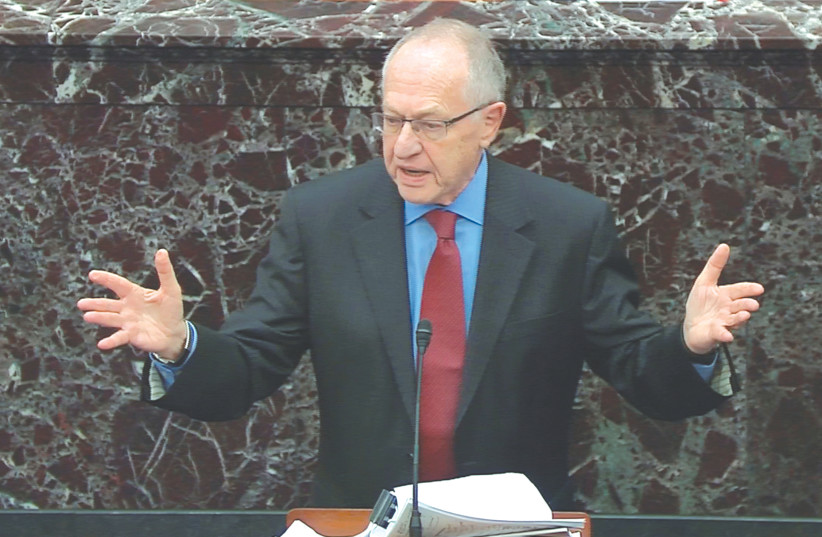US defense lawyer Alan Dershowitz, a vocal supporter of Prime Minister Benjamin Netanyahu, said on Sunday that if he had been in Israel on Saturday night, he would have joined the protests in Tel Aviv.
Thousands took to the streets of Tel Aviv on Saturday night to protest the judicial plan that the government is planning. This judicial reform, according to Dershowitz, is a threat to "civil liberties" and "minority rights."
The famed professor told Army Radio on Sunday morning that "Israel's democracy is not in danger."
"Indeed, the reforms are designed to improve democracy: majority rule," he explained. "What's in danger are civil liberties, minority rights. There's a direct conflict between pure democracy, where the Knesset rules because it represents the majority of people, and the rights of minorities and civil rights, which the [High Court of Justice] of Israel is designed to protect."
He later clarified that he does not believe that Israel will become like Poland, Turkey or Hungary because in those countries, "the majority does not rule," but in Israel it does. "There's a danger that it will become less sensitive to civil liberties and minority rights, but I would not compare it to authoritarian countries in which the majority does not rule," he said.
"There's a danger that it will become less sensitive to civil liberties and minority rights, but I would not compare it to authoritarian countries in which the majority does not rule,"
Alan Hershowitz
Dershowitz's disapproval of the attempted judicial reform
Dershowitz, as mentioned, is a friend and confidante of Netanyahu. The two spoke in mid-December, during which Dershowitz expressed his disapproval of the attempted judicial reform.
"I told him my very strong negative views about these reforms, about the Override [clause] and about changing the method in which judges are selected," he told Army Radio. "For years and years, Benjamin Netanyahu has been a strong supporter of the Israeli Supreme Court. The word he used with me over and over again was, 'We have to strike an appropriate balance.' I do not think these reforms strike an appropriate balance."
Dershowitz indeed told The Jerusalem Post's Yonah Jeremy Bob one month prior that he believes Netanyahu should back off from the plan to override the Supreme Court.
"I am warning against and criticizing efforts to weaken the Supreme Court and [efforts to weaken] the power of the Supreme Court to strike down legislation which violates [preexisting] laws and fundamental liberties," he said at the time.
Then, it was clear that Dershowitz is taking on a series of public statements in a public campaign to convince Netanyahu how to handle the issue.
Dershowitz, speaking Sunday to Army Radio, clarified that he believes the only reason Netanyahu is pushing these reforms forward is that he was forced into it by some sort of coalition compromise by his political allies.
"The same thing is happening in the United States today," he said. "Today, it's the Left that wants to weaken the Supreme Court. It wants to have court packing, it wants to have term limits, and it wants to have different methods of selecting justices.
"It's in the nature of democracies that compromises are made," he continued. "I think it's a tragedy that the compromises do weaken the Supreme Court. That's a mistaken place to make a compromise. I wish Prime Minister Benjamin Netanyahu would not allow his right wing to dictate to him what the appropriate balance should be."
On the international front, as well, Dershowitz believes that weakening Israel's High Court will weaken Israel in the international public eye, a place where Israel struggles as is.
"I think [these reforms] will weaken Israel's legal Iron Dome," he explained. "I think the Supreme Court of Israel has been a very important fact in why the International Criminal Court doesn't have jurisdiction in Israel over what's known as complementarity."
He further explained that with a weakened justice system, it will be far more difficult for Israel's defenders abroad – indeed, like Dershowitz – to defend Israel.
"One of the major weapons we've had has been the Supreme Court," he said. "Even when the Knesset or the prime minister or the military sometimes oversteps their bounds, it's the Supreme Court that has most often imposed civil liberties and basic human rights, and so it would be a tragedy to see the Supreme Court weakened."
Yonah Jeremy Bob contributed to this report.

